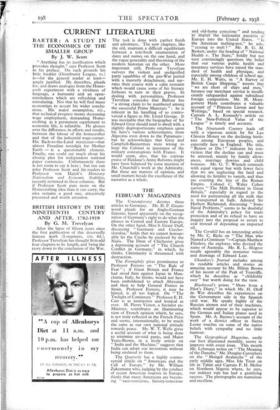THE FEBRUARY MAGAZINES
The Contemporary devotes three articles to Germany. Mr. H. P. Green- wood pleads for an Anglo-German Entente, based apparently on the recog- nition of Germany's right to do what she pleases in Central and Eastern Europe. On the other hand, Miss S. Grant Duff, discussing "Germany and Czecho- slovakia," holds that we cannot honour- ably let the Czechs be enslaved by the Nazis. The Dean of Chichester gives a depressing account of "The Church Conflict in Germany," in which, he thinks, Christianity is threatened with destruction.
The Fortnightly gives prominence to Professor Ferrero on "The Rule of Fear " ; if Great Britain and France had stood firm against Japan in Man- churia, Italy, he thinks, would not have been emboldened to attack Abyssinia and then to help General Franco in Spain. Professor Ferrero, it may be hinted, is all too logical. On "The Twilight of Comintern" Professor E. H. Carr is as instructive and ironical as ever. M. Pierre Vienot, a Socialist ex- Minister, contributes an illuminating view of French opinion which, he says, is not truly reflected in the French Press and seems, internationally, to be much the same as our own national attitude towards peace. Mr. W. T. Wells gives a useful account of what is being done to minimise air-raid panic, and Major Yeats-Brown, in a lively article on "India and the Machine," suggests that India can adopt our inventions without being enslaved to them.
The Quarterly has a highly contro- versial article on "Americans and the Call of Europe" by Mr. William Zukemiann who, judging by the conduct of recent American tourists in Europe, thinks that many Americans are becom- ing "race-conscious, history-conscious and old-home conscious" and tending to FM-port the nationalist passions of gurope into the United States. "Is the American melting-pot," he asks, "ceasing to melt?" Mr. B. G. M. Baskett, under the heading of " National Health v. The State," boldly but not very convincingly questions the belief that our various public _ health and insurance services have raised the stan- dard of health and physique, and especially among children of school age. Mr. E. H. Watts in "A Survey of British Cargo Shipping," asserts that "we are short of ships and men," because our merchant service is insuffi- ciently safeguarded against subsidised foreign competition. Mr. H. Mont- gomery Hyde contributes a valuable account of "Princess Lieven and her Writings," based on special research. Captain A. L. Kennedy's article on "The Non-Political Value of the League" is timely and accurate.
The Nineteenth Century leads off with a vigorous article by Sir Leo Chiozza Money on the declining birth- rate among European peoples, and especially here in England. His title, "Renew or Die ! " indicates his con- viction that the decline can and must be arrested, mainly by family allow- ances, marriage dowries and child bonuses. Mr. G. T. Wrench contends with equal vigour but with fewer facts that we are neglecting the land and allowing its fertility to vanish, and thus are courting the fate of the Roman Empire. Colonel C. Waley Cohen surveys "The Milk Problem in Great Britain," especially in regard to the need for pasteurising all the milk that is transported in bulk. Admiral Sir Herbert Richmond, discussing "Some Naval Problems," seems to be doubtful of the Admiralty's policy for trade protection and of its refusal to have an inquiry into the proposal to revert to coal instead of depending on imported oil.
The Cornhill has an interesting article by Mr. C. Ricks on "The Man who Named a Continent "—Captain Matthew Flinders the explorer, who devised the name of Australia. Mr. R. L. Megroz recalls agreeably the nonsense verses and drawings of Edward Lear.
Chambers's Journal includes among its readable articles and stories an amusing account by Mr. Hilton Brown of his ascent of the Peak of Teneriffe, which he describes as "childishly easy" but worth doing for the view.
Blackwood's prints "More from a Pilot's Diary," in which Mr. H. Oloff de Wet describes his experiences on the Government side in the Spanish civil war. He speaks highly of the Russian airmen and of their machines, which would appear to be superior to the German and Italian planes used in Spain. Mr. A. Baynes's account of the work of a district officer in Sierra Leone touches on some of the native beliefs with sympathy and no little humour.
The Geographical Magazine, easily our best illustrated monthly, seems to improve with every issue. This month Mr. Lehmann writes on " The Meaning of the Danube," Mr. Douglas Carruthers on the "Mongol Avalanche" of the early middle ages, Miss Ida Treat on life in Tahiti and Captain F. H. Mellor on Northern Nigeria where, he says, our indirect rule has had a gratifying success. The photographs are numerous and excellent.














































 Previous page
Previous page